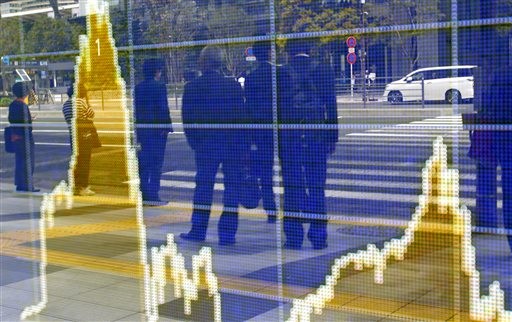Future of the global economy after Trump's victory
The outcome of the US presidential election is extremely important for the global economy because it will determine the future of two aspects, global international trade patterns and the global monetary system.
Change Size
 Slowing growth -- In this April 8, 2016 file photo, people are reflected on the electronic board of a securities firm in Tokyo. The IMF on Tuesday, April 12 downgraded its outlook for growth for most regions and for the global economy as a whole. It now foresees a weaker financial landscape than it did in January. Like the World Bank and the Organization for Economic Cooperation and Development, the IMF has repeatedly overestimated the strength of the world economy in the aftermath of the 2008 financial crisis. (AP/Shizuo Kambayashi)
Slowing growth -- In this April 8, 2016 file photo, people are reflected on the electronic board of a securities firm in Tokyo. The IMF on Tuesday, April 12 downgraded its outlook for growth for most regions and for the global economy as a whole. It now foresees a weaker financial landscape than it did in January. Like the World Bank and the Organization for Economic Cooperation and Development, the IMF has repeatedly overestimated the strength of the world economy in the aftermath of the 2008 financial crisis. (AP/Shizuo Kambayashi)
T
he result of the American presidential election came about quite unpredictably for many people. Market players reacted negatively, as shown by exchange rate depreciations and stock market falls in many important markets on the day of election.
This was more likely due to the unexpected result of the election and thus will likely be short-lived. The markets will stabilize in no time. What is far more important is the possible impact of Trump’s victory on the global economy in the medium and long run.
The outcome of the US presidential election is extremely important for the global economy because it will determine the future of two aspects, global international trade patterns and the global monetary system.
During his presidential campaign, Donald Trump has floated the idea of developing the US economy based on a very nationalist-centric view. One of the plans is to slap a 45 percent tariff on Chinese imports and rip up the North American Free Trade Agreement (NAFTA) in order to “protect US workers”.
If he is to implement this policy when he becomes president, then this is bad news not only for the global economy, but also for America itself. Trade protectionist policies through the implementation of trade barriers have often been used by politicians to lure voters as these policies sound more advantageous for middle-to-lower class workers.
But this is not true for at least two reasons.
First, US consumers and producers who use imported unfinished goods for their production have benefitted from lower import tariffs as import goods are much more affordable.
Second, erecting trade barriers and overturning trade agreements are prone to retaliation of similar policies by trading partners, which will result in trade wars between countries. It is like a ripple effect. If you are raising your fence against your neighbours, be prepared for your neighbours to raise their fence against you.
For instance, if US policies increase tariffs on Chinese imports comes to pass under the Trump administration, then China could do the same thing to US exports to China. This can damage not only China’s growth, but could also send the half-recovered US economy back into deep recession.
A sick China and a protectionist US will only lead to global recession.
It is true that international trade may create local winners and losers within a country, but there are far more winners than losers and it is government responsibility to redistribute gains within a country. Thus, protectionism is never a solution.
The second possible important implication of Trump’s victory is on the global monetary system. This issue is extremely important for the global economy due to the fact that the US Federal Reserve is the only institution responsible for the supply of US dollars in the global economy, and the fact that the US dollar is still the chief reserve currency in the world.
It literally means that the Fed is one of the very few institutions in the world with the ability to determine global liquidity. Thus, whatever policy actions the Fed takes, it can influence global financial stability.
For example, in order to boost economic growth after the 2007-2008 financial crisis, the Fed launched the biggest, most untested monetary experiment ever attempted by a central bank — US$3.5 trillion of quantitative easing, or printing money.
An earlier episode of quantitative easing had been successful in halting a global recession, but latter episodes of quantitative easing destabilized the portfolio capital inflows of many emerging economies.
Unlike more stable foreign direct investment, this type of inflow tends to appreciate emerging markets’ currencies, increasing domestic asset prices and financial instability. In addition, portfolio capital inflows are also very prone to sentiment shifts, which can lead to sudden capital reversals.
What happens to the global monetary system when Trump takes office will depend on to what extent the Fed’s independence is maintained. If it is jeopardized under the Trump administration in order to solely achieve national interests, then the impact can be disastrous to the global economy.
We have seen that despite further liquidity being aggressively pumped into global the monetary system, the growth of the US and world economy has still been stubbornly sluggish. Thus, the chances are that the US monetary policy will remain accommodative in its stance, and wait for the US real sector to recover, which is likely to take some time.
If Trump is willing to take his hands off the Fed’s policies and administration, then the outcome for the global economy is less worrying because we can expect the Fed to keep the global economy under its consideration before taking any policy actions, as has been shown by the Fed under Janet Yellen.
But many times in his campaign rhetoric, Trump criticized the Fed of being opaque and holding interest rates too low for too long. This sounds like a president who is willing to put more political pressure on the central bank.
He may be tempted to influence the Fed to increase policy rates without taking into careful account the current global economic situation.
Trump could increase global financial instability amid the current gloomier-than-expected global growth. But let’s wait and see.
Some people believe that Trump raised controversial policies and radical agenda to merely win attention and raise popularity, and that it will be very difficult for him to really implement his controversial agenda, at least to the extent that he has promised.
Time will tell.
***
The writer is an economic analyst at Bank Indonesia (BI), currently pursuing a PhD at the University of York, England. The views expressed are her own.
---------------
We are looking for information, opinions, and in-depth analysis from experts or scholars in a variety of fields. We choose articles based on facts or opinions about general news, as well as quality analysis and commentary about Indonesia or international events. Send your piece to community@jakpost.com.









